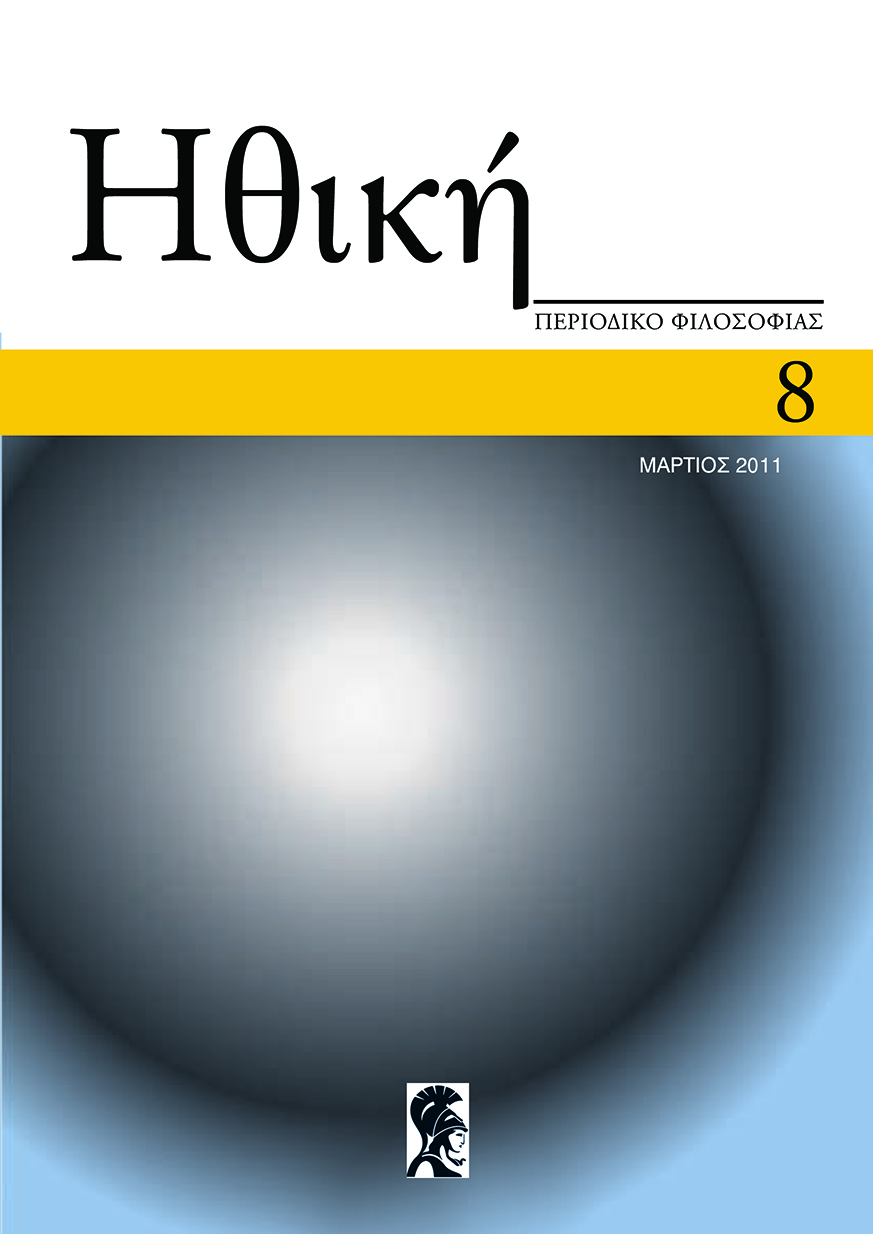Jurisprudence, Legal ethics and Virtue
Περίληψη
Δεν διατίθεται περίληψη
Λεπτομέρειες άρθρου
- Πώς να δημιουργήσετε Αναφορές
-
Franeta, D. (2020). Jurisprudence, Legal ethics and Virtue. Ηθική. Περιοδικό φιλοσοφίας, (8), 46–67. https://doi.org/10.12681/ethiki.22737
- Τεύχος
- Αρ. 8 (2011)
- Ενότητα
- Άρθρα
Οι Συγγραφείς που δημοσιεύουν εργασίες τους σε αυτό το περιοδικό συμφωνούν στους παρακάτω όρους:
- Οι Συγγραφείς διατηρούν τα Πνευματικά Δικαιώματα και χορηγούν στο περιοδικό το δικαίωμα της πρώτης δημοσίευσης ενώ ταυτόχρονα τα πνευματικά δικαιώματα της εργασίας προστατεύονται σύμφωνα με την Creative Commons Attribution License που επιτρέπει σε τρίτους - αποδέκτες της άδειας να χρησιμοποιούν την εργασία όπως θέλουν με την προϋπόθεση της διατήρησης των διατυπώσεων που προβλέπονται στην άδεια σχετικά με την αναφορά στον αρχικό δημιουργό και την αρχική δημοσίευση σε αυτό το περιοδικό.
- Οι Συγγραφείς μπορούν να συνάπτουν ξεχωριστές, και πρόσθετες συμβάσεις και συμφωνίες για την μη αποκλειστική διανομή της εργασίας όπως δημοσιεύτηκε στο περιοδικό αυτό (π.χ. κατάθεση σε ένα ακαδημαϊκό καταθετήριο ή δημοσίευση σε ένα βιβλίο), με την προϋπόθεση της αναγνώρισης και την αναφοράς της πρώτης δημοσίευσης σε αυτό το περιοδικό.
- Το περιοδικό επιτρέπει και ενθαρρύνει τους Συγγραφείς να καταθέτουν τις εργασίες τους μέσω διαδικτύου (π.χ. σε ένα ακαδημαϊκό καταθετήριο ή στους προσωπικές τους ιστοσελίδες) πριν και μετά από τις διαδικασίες της δημοσίευσης, καθώς αυτό μπορεί να οδηγήσει σε παραγωγική ανταλλαγή ιδεών και σκέψεων καθώς επίσης και σε γρηγορότερη και μεγαλύτερη χρήση και ευρετηρίαση της δημοσιευμένης εργασίας (See The Effect of Open Access).
Λήψεις
Τα δεδομένα λήψης δεν είναι ακόμη διαθέσιμα.
Αναφορές
The central difference between a wide and narrow interpretation of jurisprudence is often viewed in the acceptance or the rejection of the claim that law is politically and morally neutral. Wider concepts of jurisprudence, such as, for instance, the liberal, Marxist or feminist, are usually legitimated by means of justification of the first claim (Smith, P. In: Patterson, 2003: 303).
It should be noted that Pound rejected the narrow, positivistic understanding of science (Pound, 2008: 10). Tn his view, science of law relies upon four main methods: analytical, historical, philosophical and sociological (Ibid., 20).
Jurisprudence is the knowledge of things human and divine, the science of the just and the unjust.
There is some controversy about whether some of these terms could be more precisely differentiated regarding the legal status that had been ascribed to them (Tuori, 2004: 304-307).
On discussions regarding this issue: Tuori, 2004.
Cicero praised the unity of the knowledge of law and the knowledge of rhetorics espeacially through the figure of Crassus in his work De Oratore (Cic. De or. 1.46.).
Following the German historian Franz Wieacker, Hans-Georg Gadamer pointed out that Roman lawyers and their practice had corresponded with phronesis more than sophia (Gadamer, 1978: 46).
An interesting analysis of the notion of natural law by Cicero and the idea that it was related to prudentia is offered in: Inwood, B., Miller, F. D. Jr., 2007: 143-147. The authors make a difference between the natural law as perfected (natural) human virtue and natural law as laws found in and constitutive of a polity that are grounded in nature via their relationship to the perfect divine law of gods and sages (Ibid. 145). They suggest that Cicero maybe could not reconcile these two meanings of the natural law, bur at the same time emphasize the evidence for Cidentifications of law and the right reason (orthos fogos) and bring the idea of natural law present in the writings of Cicero into connection with the Chrysippean idea that the natural law is perfected reason. They underscore the translation of Chrysippus’ On Law in Cicero, Leg.1.18, which concludes that the natural law in question is the virtue of practical wisdom (SIC!) (prudentia) (Ibid. 144).
The possible influence of Chrysippus’ understanding of law should not be disregarded: Law is king over all divine and human things. (Marcianus, Dig. 1.3.2)
In Perelman's opinion the complete legal reasoning is only the act of judge while the prosecutor's and lawyer's reasoning are only segments of it (Perelman, 1983: 95). Perelman, of course, insists that legal reasoning is not a simple logical deduction, but it requires interpretation and qualification.
Council of Bars and Law Societies of Europe (CCBE).
International Bar Association (IBA).
International Association of Prosecutors (IAP).
One interesting attempt to systematically develop a set of judicial virtues with respect to the relationship of profession, virtue and character, was made by Lawrence Solum. He asserted that among the inevitable judicial virtues there were: judicial temperance, judicial courage, judicial temperament, judicial intelligence, judicial wisdom and justice. He demonstrated how these virtues were interrelated and how their deficiency caused the deterioration or impairment of law (Solum, 2002). Andrew Aberdcin made an attempt to elaborate on a more comprehensive
and extensive set of virtues of lawyers than those presented in codes (Aberdein, 2010).



